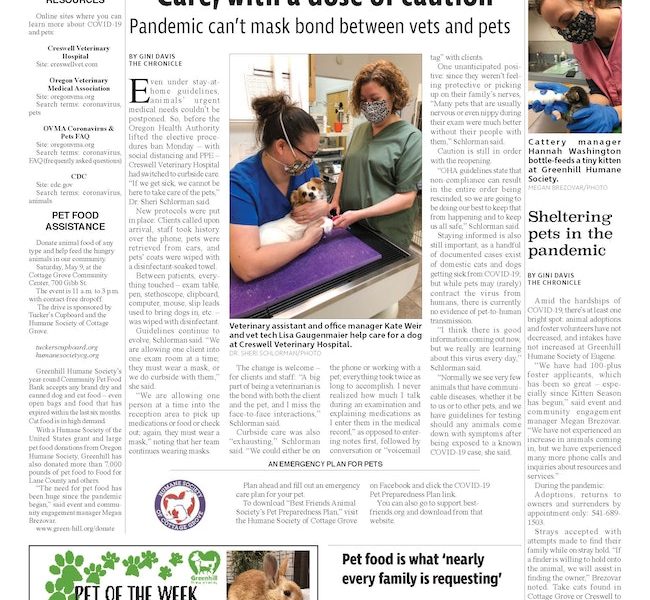
Even under stay-at-home guidelines, animals’ urgent medical needs couldn’t be postponed. So, before the Oregon Health Authority lifted the elective procedures ban Monday – with social distancing and PPE – Creswell Veterinary Hospital had switched to curbside care. “If we get sick, we cannot be here to take care of the pets,” Dr. Sheri Schlorman said.
New protocols were put in place: Clients called upon arrival, staff took history over the phone, pets were retrieved from cars, and pets’ coats were wiped with a disinfectant-soaked towel.
Between patients, everything touched – exam table, pen, stethoscope, clipboard, computer, mouse, slip leads used to bring dogs in, etc. – was wiped with disinfectant.
Guidelines continue to evolve, Schlorman said. “We are allowing one client into one exam room at a time; they must wear a mask, or we do curbside with them,” she said.
“We are allowing one person at a time into the reception area to pick up medications or food or check out; again, they must wear a mask,” noting that her team continues wearing masks.
The change is welcome – for clients and staff: “A big part of being a veterinarian is the bond with both the client and the pet, and I miss the face-to-face interactions,” Schlorman said.
Curbside care was also “exhausting,” Schlorman said. “We could either be on the phone or working with a pet; everything took twice as long to accomplish. I never realized how much I talk during an examination and explaining medications as I enter them in the medical record,” as opposed to entering notes first, followed by conversation or “voicemail tag” with clients.
 Veterinary assistant and office manager Kate Weir and vet tech Lisa Gaugenmaier help care for a dog at Creswell Veterinary Hospital. DR. SHERI SCHLORMAN/PHOTO
Veterinary assistant and office manager Kate Weir and vet tech Lisa Gaugenmaier help care for a dog at Creswell Veterinary Hospital. DR. SHERI SCHLORMAN/PHOTO
One unanticipated positive: since they weren’t feeling protective or picking up on their family’s nerves, “Many pets that are usually nervous or even nippy during their exam were much better without their people with them,” Schlorman said.
Caution is still in order with the reopening.
“OHA guidelines state that non-compliance can result in the entire order being rescinded, so we are going to be doing our best to keep that from happening and to keep us all safe,” Schlorman said.
Staying informed is also still important, as a handful of documented cases exist of domestic cats and dogs getting sick from COVID-19; but while pets may (rarely) contract the virus from humans, there is currently no evidence of pet-to-human transmission.
“I think there is good information coming out now, but we really are learning about this virus every day,” Schlorman said.
“Normally we see very few animals that have communicable diseases, whether it be to us or to other pets, and we have guidelines for testing should any animals come down with symptoms after being exposed to a known COVID-19 case, she said.








